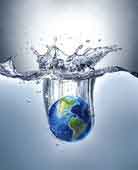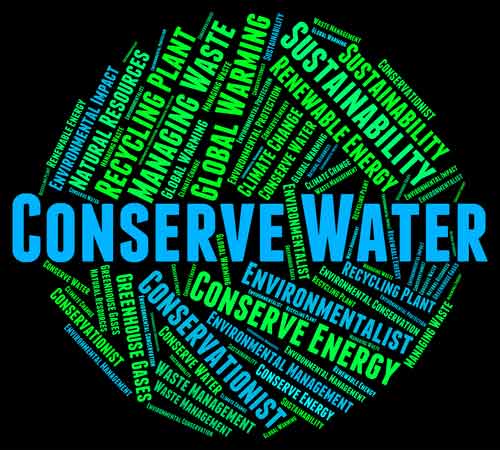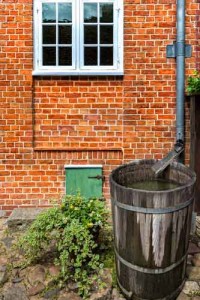Why Saving Water During Summer is Key
Water covers more than 70 percent of the earth’s surface. Unfortunately, most of it is salt water and unfit to drink. Both people and animals need fresh water to survive. What happens when there are water shortages?
 Sources of Water
Sources of Water
Ground Water
- Wells and springs provide water for people who do not live close to municipal water sources. Some areas of Africa depend on deep wells for their water. Some of these sources may be contaminated since users have neither the means nor the knowledge to test their drinking water.
Surface Water
- Civilizations settle near water sources. Lakes and rivers provided small populations with easy access to drinking water. As populations grow, municipal leaders find water sources to meet the needs of more people.
Replenishing Water Sources
Nature provides two ways to replenish water sources: winter snows and rain.
- Winter Snows
- Melting winter snows replenish rivers, streams, and reservoirs. New Mexico and other Western states depend on winter snow to supply their water needs. If the snowfall is inadequate, water shortages occur; and people must practice water conservation.
- Rain
- Rain adds water to rivers, streams, and ground. The gentle rain that soaks into the ground is best for sustaining water supplies. Torrential rains cause flooding and do little to replenish drinking water sources.
When Sources Run Dry

- Buying and Selling Water
- Some areas have resources that allow them to buy water from outside sources. These countries include Bahrain, Qatar, and Kuwait. On the other hand, Siberia and Canada have a surplus of water that can be sold to Central Asia, North Africa, and the American southwest.
- Moving to an Area with Water
- People who move to new locations where water is a place of more demand on the system. As demands increase, municipal leaders face new water conservation and water waste challenges.
- Die of Thirst
- No one likes to think about this option, but many people face it every day. Water shortages are a global problem. What if it is your next problem?
Other Causes of Water Shortages
- Political Unrest
- During Libya’s political upheaval, thousands of people were cut off from water supplies. Tripoli suffers through periods of fuel, food and water shortages. Water has become as a political weapon.
- Violence and Terrorism
- Since there is little natural water in Yemen, the people rely on outside sources. Terrorists who travel through Yemen disrupt the delivery of water.
- Arid Climates and Climate Change
- Global climate changes make it impossible to know where the next water shortage will occur. People who have clean water with every turn of the faucet handle may discover water scarcity in their neighborhood. Whether these shortages are temporary or permanent, people should practice water conservation.
You and Your Local Water Company
Municipal authorities build delivery systems that bring fresh water into residences and businesses. Although purification procedures remove most harmful substances from the water, some people purchase filters for extra protection.
Do you Need a Filter?
A qualified plumber can recommend the proper filter to resolve the following:
Water Treated with Chemicals
- Chlorine and other chemicals are used to kill or remove various organisms that can make you sick. However, these chemicals remain in the water; and some people use a filter to remove them.
- Old Water Mains
- Old water mains may cause your drinking water to be colored or have an odd odor. Old iron pipes depositing rust particles into your water may cause this problem. Although the water is not a health hazard, some people use a filter to remove the odor and improve taste
- Bacteria and Microorganisms
- Pathogens such as Cryptosporidium, E. coli, and others can make you ill. Infants and senior citizens are more susceptible to these organic contaminants. Some people install filters to guard against these dangers.
- Lead
- Older city water systems may contain lead. This material was used in water systems before people were aware of its dangers. Lead in drinking water can cause chronic diseases and childhood developmental difficulties. Flint, Michigan has recently discovered lead in their water system.
Conserving Water and Water Waste Concerns
Your local water source is a lake, river or reservoir. During summer months, water sources are decreased due to heavier demand. Watering lawns, flowers and gardens increase the need for water. Winter snows and rains are months away, and you should practice the following:
In the Kitchen
- Dishwashers use less water than washing by hand.
- Research each dishwasher’s water efficiency before purchasing a new one.
- Use one glass for drinking each day. No need to wash several glasses.
- Soak pots and pans before scraping. Do not use running water for cleaning.
- Use a pan to wash fruits and vegetables.
- Water your house plants with the water you used to wash fruits and vegetables.
In the Bathroom
- Install an efficient shower-head
- Wet soap and washcloth. Turn shower off. After using the washcloth on your body, turn the shower on and rinse.
- Turn off water while brushing teeth
You can find much more water-saving ideas on the Internet, at your water company and your plumber’s. Please do your part and conserve water this summer.
For more information on how to save water in your Stuart, FL home, call Allore’s Plumbing Services LLC at (772) 288-0998.

 Sources of Water
Sources of Water Water Treated with Chemicals
Water Treated with Chemicals